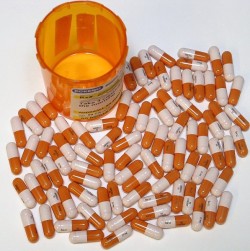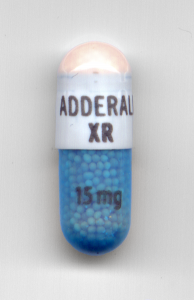What is Adderall?
What is ADHD?
Criticism of Adderall
Who should NOT use Adderall
Canadian Recall: Adderall Deaths
Serious Side Effects
In February 2006, the FDA announced they have received 51 reports of sudden death in children and adults who took ADHD medications such as Adderall. In 2004, the agency asked regulators to begin closely monitoring for heart attacks, high blood pressure, and other serious cardiovascular injuries in patients taking these prescription stimulants. The news of this Adderall warning is coming over a year after the concern began mounting, posing a threat to millions of patients unaware of these possible risks. If you or a loved one has been injured by Adderall, learn more about how we can help you.
What is Adderall?
Adderall (a combination of dextroamphetamine and amphetamine) is a prescription stimulant used to treat adults and children (over the age of six) with Attention Deficit Hyperactivity Disorder (ADHD) and narcolepsy. Adderall was the second drug to be approved to treat ADHD, following Ritalin’s already long stay on the market. The FDA approved Adderall in 1996 and later approved Adderall XR Extended-Release capsules in 2001. Shire Pharmaceuticals Group Plc manufactures this popular ADHD medication. Millions of people have taken this drug, with and without a prescription (which will be discussed in detail below).
What is ADHD?
ADHD, or Attention Deficit Hyperactivity Disorder, is a condition characterized by difficulty concentrating, hyperactivity, and impulsiveness. Adults and children with this condition are often unable to concentrate for significant periods, and are often more restless, impulsive, and hyperactive compared to peers. Experts report that ADHD affects between three and five percent of school aged children. Prescription amphetamines, such as Adderall, are often prescribed to patients with ADHD to reduce and control symptoms.
Criticism of Adderall
For several years, parents, doctors, and other citizens have expressed deep concern about Adderall use. Many critics claim that Adderall and similar medications are widely over-prescribed to children who may exhibit behavioral problems that mimic, but are not caused by, ADHD. Another major concern about Adderall and similar medications are their high potential for abuse and addiction.
On college campuses nationwide, Adderall and other ADHD medications are quickly becoming drugs of choice as popular study aids. It seems caffeine just does not cut it anymore for late night cram sessions. More and more young students are abusing Adderall, stating that the drug improves concentration and increases stamina during long hours of study. Many assume that because the drug is legal for prescription use, it must be relatively safe. According to recent studies, widely used—and abused— ADHD drugs may not be very safe at all.
Who Should NOT Use Adderall?
 As with any prescription medication, there are some people for whom Adderall is not appropriate or safe. For these people, the risk of serious Adderall side effects typically outweighs the potential benefits of the drug. Patients with the following conditions should NOT take Adderall or related ADHD medications:
As with any prescription medication, there are some people for whom Adderall is not appropriate or safe. For these people, the risk of serious Adderall side effects typically outweighs the potential benefits of the drug. Patients with the following conditions should NOT take Adderall or related ADHD medications:
- History of prescription drug, street drug, or alcohol abuse
- A heart defect, or other structural abnormalities
- High blood pressure
- Cardiovascular disease
- Glaucoma
- Hyperthyroidism
- Current or recent use of Monoamine Oxidase Inhibitors (MAOIs)
Concurrent use of Adderall and MAOIs can cause fatal reactions including:
- High body temperature
- Seizures
- Coma
MAOI’s can include Nardil, Parmate, Marplan and other brands
* Pregnant or breast-feeding: Women using Adderall have an increased risk of delivering premature and/or low birth weight babies. Babies born to mothers taking Adderall have also shown drug withdrawal symptoms including drowsiness and agitation. Studies indicate that Adderall can pass through breast milk, posing risks to the infant.
Canadian Recall: Adderall Deaths
In February 2005, the Health Canada (the Canadian equivalent to our FDA) pulled Adderall off the market after receiving 20 reports of children who died suddenly while taking Adderall. According to the regulatory agency, they received safety information concerning the association of sudden deaths, heart-related deaths, and strokes in children and adults taking recommended doses of Adderall and Adderall XR. This risk of Adderall death seemed particularly high for individuals with structural heart abnormalities.
In response to these findings, the FDA issued an advisory warning about the possible risk of death, but allowed the drug to remain on the market. In August 2005, Health Canada allowed Adderall to re-enter the market because the agency was unable to prove (within that six-month period) that Adderall was more dangerous than other ADHD medications. While Adderall continues to be sold, there are serious risks associated with this popular medication.
Serious Adderall Side Effect Risks
According to Shire Pharmaceuticals and the FDA, there are serious Adderall side effect risks of which patients and healthcare professionals should be aware. These include:
-
HIGH ABUSE POTENTIAL
Adderall carries a black box warning—the strongest warning issued by the FDA short of a drug recall—informing consumers about the serious risk of Adderall abuse. This Adderall warning states that taking amphetamines for long periods may lead to Adderall addiction. The warning details the significant risks posed when Adderall is taken for non-therapeutic use or is distributed to others. The Adderall black box warning also states that misuse of Adderall can cause sudden death and serious cardiovascular events.
-
SUDDEN DEATH
According to February 2006 reports, at least 24 Adderall deaths were reported to the FDA between 1999 and 2003. Other cases of possible Adderall death were not counted because the deceased used other drugs, the deaths fell out of the parameters of the study, or the deaths were to non-US citizens. Thus, the number of Adderall deaths may be significantly underestimated.
-
PSYCHOSIS
Adderall side effects can aggravate or cause psychosis in patients with existing mental conditions. Patients with previous mental conditions should be carefully monitored for signs of Adderall psychosis. This Adderall risk can be significant given that a large percentage of people suffering from ADHD also suffer from co-morbid psychological disorders.
-
CARDIOVASCULAR INJURY
Evidence shows that Adderall may increase the risk of serious cardiovascular events including heart attack, stroke, high blood pressure, and other serious conditions. This Adderall side effect risk appears to be greater in people with a history of cardiovascular conditions and those who misuse this drug.
-
WORSENING TICS
Adderall side effects can worsen tics and Tourette’s disorder.
-
STUNTED GROWTH AND WEIGHT LOSS
Particularly in children, Adderall can decrease growth and cause significant weight loss. Children who take Adderall for long periods should be carefully monitored for these Adderall side effects by having their height and weight measured regularly.
Other Adderall Side Effects
Other Adderall side effects can include:
- significant loss of appetite
- mood changes
- insomnia
- dry mouth
- headaches
 What is Happening Now?
What is Happening Now?
The FDA convened an advisory panel to discuss how to evaluate Adderall safety and the safety of all ADHD medications in February 2006. Though this panel was not asked to make regulatory recommendations, the panel quickly ruled that a BLACK BOX WARNING, the strictest warning possible, should be added to Adderall and other ADHD medications to warn consumers about the serious risks of sudden death and adverse cardiovascular events. The FDA took no immediate action to add this warning to Adderall or similar ADHD drugs.
Contact our New York Adderall Attorneys if You Have Suffered Side Effects
If you or a loved one has suffered serious injuries you suspect were caused by Adderall, you may wish to confer with an attorney to learn more about your legal rights and options. The attorneys of The Oshman Firm are highly experienced in handling defective drug claims and are prepared to protect your legal rights. Please contact us today for a FREE CONSULTATION to learn more. You may be eligible to seek compensation for your medical expenses, other losses, and suffering.
